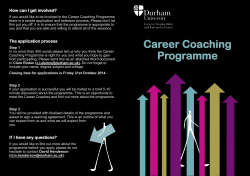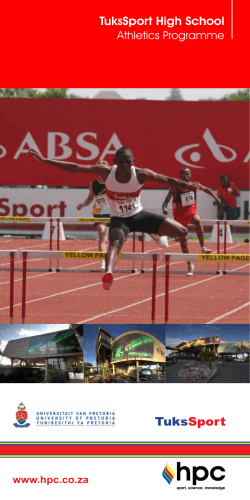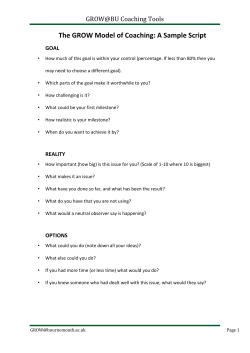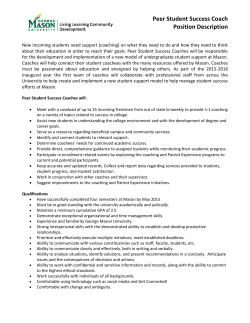
Chapter 11: Teaching and Coaching Careers in Physical Education and Sport
Chapter 11: Teaching and Coaching Careers in Physical Education and Sport What are the advantages and disadvantages of pursuing a teaching career? What are the similarities and differences between teaching and coaching? What is the effect of burnout on teachers and coaches? Teaching Careers School and non-school settings Have high expectations for all students. Keep students involved in relevant activities. Create and atmosphere that promotes learning. What are some of the reasons that people go into the teaching profession? What are your reasons for entering the teaching profession? Benefits and Drawbacks of Teaching BENEFITS: DISADVANTAGES: Salary Lack of financial support Teach diverse activities Inadequate facilities Offers job tenure Discipline problems Intrinsic rewards Overpopulated classes Opportunity to coach Non-subject related In duties (lunch duty, etc.) non-school settings: Clients are voluntary Opportunity to specialize in an area In non-school settings: Lack job security Various work hours Qualities of Effective Teachers Organizational skills Communication skills Instructional skills Motivational skills Human relations skills Competencies for Beginning Teachers NASPE Content knowledge Growth and development Diverse learners Management and Motivation Communication Learning and Instruction Learner Assessment Reflection Collaboration Developmentally Appropriate Physical Activity Experiences With the growth of physical activity programs outside of the school setting, the following elements should be considered when creating a program that is developmentally appropriate: Curriculum Movement concepts and skills Cognitive development Affective development Fitness concepts Fitness tests Calisthenics Fitness Assessment Regular involvement Active participation Activities Equity Success rate Time Facilities Equipment Teaching Responsibilities Instructional Tasks (related directly to teaching) Explaining or performing a skill, or strategy, and evaluating students’ performances. Managerial Tasks (related to the administration of class) Taking attendance, dealing with discipline problems, supervising the locker room, handling equipment. Institutional Tasks (related to the setting in which teaching occurs) Hall duty, lunch room supervision, attend curriculum and department meetings, conduct parent-teacher conferences. May conduct research Community Responsibilities Teaching Careers School Setting K-12 (public or private) Higher education » » Basic instruction Professional Preparation Adapted physical education Special-Interest Schools Non-school Setting – Clubs – Community organizations – Centers for the elderly – Resorts – Military Teaching Certification Each state has minimum requirements that prospective teachers must reach before they become legally certified to teach. Complete standardized tests, such as PRAXIS that test: general knowledge communication skills professional knowledge specialty area (physical education or health, etc.) Public schools require certification, but private and non-school settings may not. Coaching Careers Why do people choose coaching careers? Love of the sport, influence on others, benefits of participating in physical activity, love of children, etc. Coaching responsibilities Instructional: conducting practice, coaching a game Managerial: recording statistics, dealing with equipment, giving interviews, recruiting opportunities Institutional: teaching or department duties/meetings Represent organization Counseling athletes Professional development at clinics/conventions Benefits and Drawbacks of Coaching BENEFITS: DRAWBACKS: Intrinsic rewards Long hours Excitement of winning Salaries vary greatly Respect High turnover rate Satisfaction of giving one’s Pressure to win best Help athletes learn Burnout Securing a Coaching Position Requires a great deal of expertise gained Playing experience Attending clinics and workshops Become and official in your sport Take advantage of certification/licensing programs May through: require teaching certificate or master’s degree depending on where and what you coach. May want to develop expertise in a second sport out of season to increase marketability. Gain practical experience however possible. NASPE Standards for Athletic Coaches A framework for the education of coaches included 8 domains: Injuries: Prevention, Care, and Management Risk Management Growth, Development, and Learning Training, Conditioning, and Nutrition Social/Psychological Aspects of Coaching Skills, Tactics, and Strategies Teaching and Coaching Professional Preparation and Development The Coaches Code of Conduct (2001) Ensure that the health, well-being and development of athletes is considered over the win/loss record. Serve as role models. Exemplify honesty, integrity, fair play, and sportsmanship despite the outcomes of competition. Maintain professional demeanor in all relationships. Treat everyone with respect and dignity. Committed to the education of athletes and encourage academic achievement. Coaching Certification Programs American Sport Education Program (ASEP) Training in coaching the young athlete, coaching principles, sports first aid, drugs and sport, and teaching sport skills. National Youth Sport Coaches Association (NYSCA) Program for Athletic Coaches Education (PACE) Burnout Overwhelming exhaustion, feelings of cynicism and detachment from the job, and a sense of ineffectiveness and lack of accomplishment. Causes: Lack of administrative and community support Lack of input Inadequate salaries for large teaching loads Large classes, discipline problems Absence of opportunities for professional and personal growth Teacher-coach role conflict Professional and personal problem interaction Burnout Prevention and remediation Provide meaningful in-service programs Increased feedback about performance by administration Participation in professional organizations Revitalize oneself on time off with hobbies or nonwork related activities Maintain good health Increasing Professional Marketability Build on skills and talents Need for bilingual educators. Additional coursework Adapted physical education Dual certification Become certified to teach more than one subject or even driver education. Practical experience Join professional organizations and network. Demonstrate use of technology
© Copyright 2025





















